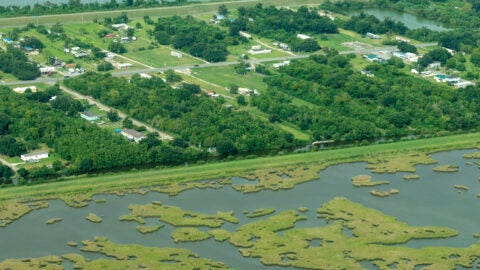Young professionals tackle Solar Radiation Management research governance
This post was written by EDF’s Alex Hanafi and Cassandra Brunette.
What do 45 young environmental leaders from around the world have to say about the governance of emerging climate engineering technologies?
The Solar Radiation Management Governance Initiative (SRMGI) and EDF teamed up with the University of California, Berkeley to ask that question at a recent workshop.
It’s a question that has important implications for the future governance of solar geoengineering research. Also known as “solar radiation management” (or “SRM”), emerging solar geoengineering technologies are designed to cool the Earth by blocking or reflecting some of the sun’s energy back into space.
These techniques could — in theory — stop global warming quickly and relatively cheaply. However, they have potentially serious and uncertain environmental, political, and social implications. At present, few international governance mechanisms exist to ensure that SRM research would be transparent, safe, and internationally acceptable.
Our workshop was part of the Beahrs Environmental Leadership Program (ELP) at Berkeley. Participants explored the science, ethics, and governance of SRM research through a series of interactive discussions and participatory exercises.
This year’s 45 participants hailed from 33 different countries, with the overwhelming majority from developing nations. Participants were encouraged to brainstorm and share ideas about the potential role of their home countries in research governance.
Attendees expressed a wide range of opinions on SRM:
- Some suggested SRM could provide a technological solution to some of the temperature-related impacts of climate change.
- Others maintained that the root causes of anthropogenic climate change should be addressed before exploring SRM any further.
- The majority of participants called for SRM research transparency, and inclusivity in global discussions about possible governance structures for SRM research.
The diversity of participants, all convened in one location, made an ideal fit with SRMGI’s mission to develop informed international dialogue on SRM research governance. SRMGI’s goal is to bring currently underrepresented voices, particularly from developing nations, into an informed conversation about how to responsibly manage SRM research.
SRM’s potentially cheap deployment and quick effect on global temperatures could lead to the rapid and unilateral development of SRM programs, potentially provoking international tension and mistrust. Multi-stakeholder dialogue and international cooperation is critical to ensure that research into SRM is governed responsibly and transparently.
While SRMGI has hosted workshops in the United Kingdom, China, India, Pakistan, and Africa, this was SRMGI’s first event in the United States.
Stay tuned for more — SRMGI is preparing a report that will provide more details on the workshop’s agenda, interactive activities, and outcomes.
In the meantime, read more about SRMGI’s work here.











